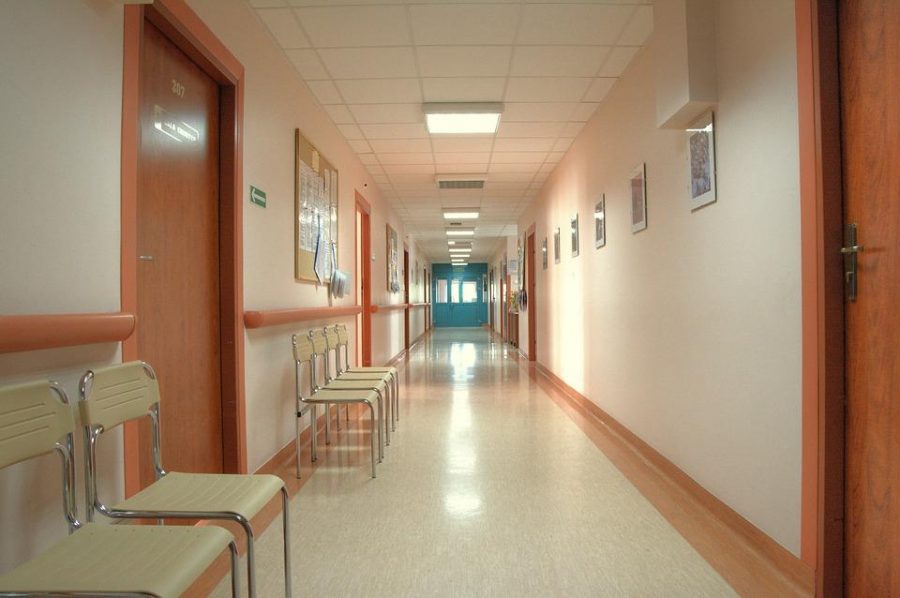Every Wednesday afternoon, Ashley Frey ’17 puts on her uniform and teen volunteer badge and spends two hours visiting patients at Cedars-Sinai Medical Center in Los Angeles. Throughout the course of each day, she will bring them water, flowers and magazines, but most importantly, she will give them her time.
“Talking to patients is really important because a lot of times they are really lonely and don’t have anything to do,” Frey said. “Having someone to talk to makes them feel supported during a hard time in their lives. It’s really rewarding to know that I can make a patient’s day better just by being there for them.”
Frey is not the only student to volunteer at the hospital. Many students spend their time helping out at various hospitals throughout Los Angeles. The reasons why each student decides to volunteer vary.
Carolyn Hong ’17 has been volunteering at Cedars since October because she enjoys the opportunity to help those going through an illness or surgery and finds that volunteering at a hospital is a rewarding way to get community service hours while giving back, she said.
“It’s really nice to be able to talk to the patients and interact with them,” Hong said. “It’s something I would never be able to experience unless I was volunteering at the hospital.”
As part of her weekly routine, Hong will assist nurses and run errands for patients, bringing them food, water and personal items such as hairbrushes, socks and playing cards that they would not have otherwise.
“The other day I got water for a woman who had cancer,” Hong said. “She was extremely nice and grateful and thanked me for the volunteer work I do, which was really rewarding.”
Student volunteers at Huntington Memorial Hospital in Pasadena provide over 35,000 hours of service each year in over 60 different areas of the hospital, providing a monetary value estimated to be over $750,000, said Mary Johnstone, the student volunteer supervisor at the hospital.
In addition to being able to help patients, many students volunteer because they are interested in pursuing a career in medicine. Their time volunteering allows them to see the inner workings of a hospital by interacting with doctors and nurses and completing administrative work.
“Volunteering in a hospital has taught me how hard everyone in a hospital works and how long the hours are, especially for doctors and nurses,” Kevin Wesel ’17said.
Wesel is also enrolled in AP science courses at school, and he said that working in the hospital allows him to see the real world applications of the theories that he learns in the classroom.
“I get to observe the daily work of doctors and see assignments getting done, which is really helpful since it could help me decide whether I want to go into a medical field later in life,” Wesel said.
One of the main reasons to volunteer at a hospital is to gain a deeper understanding of the way that a hospital runs, Johnstone said.
“One reason students volunteer is definitely for career exposure,” Johnstone said. “Students are trying to figure out what they want to do as a career, and getting themselves into the environment and seeing the daily operations of a hospital and the job duties that come with specific careers is way more eye-opening and beneficial than reading a book or seeing it on TV.”
Volunteers are also able to develop relationships with patients who are there for longer periods of time.
“One time I talked to a woman every week for over a month,” Frey said. “She was waiting for a heart transplant, and one week when she wasn’t there, I learned that she had successfully received the heart, which was such a cool thing to be a part of.”
One of Frey’s favorite parts of volunteering at the hospital is her ability to interact with people who she would usually never encounter in her life.
“I spoke to a Holocaust survivor,” Frey said. “It was good to actually connect with a person who had been through so much.”
Other students find that while the work is rewarding, the bureaucracy of a hospital can get in the way of patient interactions.
“I learned that a lot of patient-hospital interaction was more formal and policy-centered than empathetic, which makes sense logistically but isn’t something I completely realized prior to spending so much time at the hospital,” said Nicole Araya ’16, who has been volunteering at Huntington Hospital for two years. “Volunteers are not allowed to interact much with the patients because of liabilities, and a lot of the time I found myself more afraid of doing something wrong with potentially devastating consequences than excited about making a difference.”
Some volunteer simply because they’re passionate about helping others.
“I truly believe that our youth are more philanthropic that we think,” Johnstone said. “It’s amazing to me the number of students who come to volunteer for no other reason except to help. They aren’t interested in the medical field, and they haven’t had any experiences with hospitals in the past, but they want to help other people, and they feel that the sick are the most in need of that.”





























